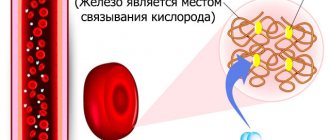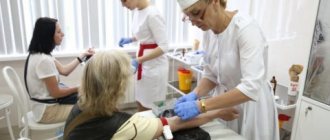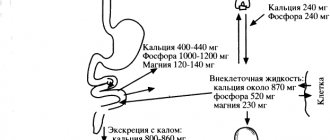What are basophils? Role and functions in the body
Basophils are one of the few components of leukocytes. They are produced as a result of the activity of the bone marrow and belong to the granulocytic subtype of white blood. Their number is minimal compared to other components. To read the analysis results, the level of basophils is calculated as their volume in the composition of leukocytes, expressed as a percentage.
After maturation, basophils move freely throughout the human body for 4-5 hours, then settle in the tissues. Their lifespan is 8-12 days. Basophils are “scout cells” responsible for detecting and deactivating foreign microparticles found in the human body. Basophils contain heparin, histamine and serotonin.
When a foreign particle is detected, these substances break down into granules and block it. The inflammatory process begins, to which all groups of leukocytes rush to cleanse the body.
Moreover, basophils themselves cannot protect the body from a foreign body or infection; their task is to recognize and send a signal to other cells. When a pest cell is blocked, basophils die due to the destruction of granules containing active substances that help recognize bacteria.
Basophils prevent allergic reactions and the development of anaphylactic shock. They also partially influence the processes of blood clotting, blood flow within small vessels and are responsible for the formation of new capillaries.
Among the most important functions of basophils is the neutralization of toxins that enter the human circulatory system. These include not only toxins from food poisoning, but also poison from insect, snake and animal bites.
Based on the number of basophils and the compliance of their indicators with general standards, conclusions are drawn about the level of human health. Norms of indicators
Basophils in the blood (the norm for women by age has different indicators) in medical practice are measured in 2 categories:
- VA% is the percentage of basophils to the total volume of leukocytes;
- BA# - absolute quantitative number (g/l).
The reference number of basophils differs by age and gender:
- in adults it is considered normal if the first indicator is in the range from 0-1%. When deciphering the analysis indicators, the norm in women of different age categories is unstable, in men it is constant. In absolute terms, this indicator ranges from 0-0.2*109g/l;
- in children the norm ranges from 0.5% to 0.75%. This value is stable. Closer to 1 year it decreases to 0.5%, then gradually increases. By the age of 12-14 years, the norm corresponds to the norm of an adult.
A systematic increase in the level of basophils in the blood is called basophilia. Most often this is a sign of an allergic reaction or an inflammatory process in the body. A low basophil count is called basopenia. The reasons for it are difficult to assess due to the rather low lower indicator.
The norm of basophils in the blood
Testing done in a clinical setting is the only way to know if basophils are higher than normal. Often, an increase in the number of white cells does not have clear symptoms, so doctors rarely refer the patient for testing. However, the cause of the increase can be identified by taking a general blood test. What is the basophil norm? Taking into account individual characteristics, in the human body there should be from 1 to 300 per μl (microliter).
Basophils make up only 0.5% of all leukocytes. In addition to this type of cells, the following can be found in the blood:
- Neutrophils. This is the largest group of leukocytes. They cope with severe infectious conditions.
- Eosinophils. Helps fight parasitic infections.
- Lymphocytes are part of the immune system and prevent the invasion of pathogens (bacteria, viruses).
- Monocytes fight antigens, infections in the bloodstream, help restore damaged tissue, and destroy cancer cells.
Reasons for increased basophils
When the level of basophils increases, first of all, it is necessary to conduct a general examination and diagnosis, since there are many reasons that increase the percentage of their content in the blood.
Main reasons:
- The body's response to allergens.
- Oncological processes of the blood, bronchopulmonary system.
- Long-term inflammation of the gastrointestinal tract.
- Hodgkin's disease.
- Acute hepatitis accompanied by jaundice.
- Hypothyroidism.
- Chicken pox.
- Infectious liver diseases.
- Chronic dermatitis or sinusitis.
- Periodic exposure to small doses of radiation.
- Therapy with hormonal drugs, mainly antithyroid and estrogen-containing types.
- Deviations in the functioning of the endocrine system and pancreas.
- Poisoning with toxic substances.
- Iron deficiency.
A slight increase in the volume of basophils during the period of rehabilitation after infectious diseases, after X-ray images and during menstruation is considered a normal phenomenon that does not cause concern.
Also, the reason for the increase in indicators may be the patient’s basic unpreparedness for the procedure of collecting material for research. The material is collected in the morning on an empty stomach. The day before the test, you should not drink alcohol and avoid physical activity.
Factors influencing basophil activity
You may try the additional steps listed below if you and your doctor decide they may be appropriate. None of these options should ever be used in place of what your doctor recommends or prescribes.
The following additional approaches are supported only by limited clinical research. There is not enough evidence to support their use in people with high basophil counts.
In a study of 44 patients, crocin
(20 mg) reduced the amount of basophil by almost 15%.
Although crocin is a compound from saffron , saffron itself is quite ineffective when used long-term. Large-scale clinical studies are needed. (, )
Saffron and its components protect the brain.
Saffron has a number of medicinal properties, such as antihypertensive, hypolipidemic, antitussive, antidepressant, anticonvulsant, anxiolytic, antioxidant, antitumor, antinociceptive and anti-inflammatory effects. (source) In a human study of 20 patients, Polygoni Cuspidatum extract had anti-inflammatory properties. In mice, it suppressed the SYK signaling pathway, present in both mast cells and basophils. This reduced the release of histamine and the production of allergic cytokines. (, )
Some studies on humans and animals have shown that tiny particles and various substances in polluted air increase the activity of basophils. (, , )
Chronic stress negatively affects the body in many ways. It increases levels of the hormones cortisol and norepinephrine, which has negative consequences for the immune system. Scientists believe that cortisol stimulates the Th2 type of immune cells, and that norepinephrine increases the activity of basophils . (, , , , )
Limited evidence suggests that exposure to antibiotics is associated with a higher risk of developing asthma. There is an assumption that this is due to incorrect reactions of basophils. However, this relationship may be indirect or inconsistent and remains unproven. (, , )
EVEN MORE USEFUL INFORMATION
Allergies - Survival Tips
Histamine: food and other stimuli to increase it
Reasons for lowering the level
Basophils in the blood (the norm in women by age depends not only on natural phenomena in the body, but also on pregnancy) with reduced levels do not always symbolize signs of illness. Pregnant women should not worry as this is common during the 1st and 3rd trimesters.
In other cases, the level decrease is affected by:
- Systematic stress.
- Pneumonia.
- Various infections.
- Pathologies of the adrenal glands.
- Excessive physical activity.
- Ovulation.
Also, a decrease in indicators is observed when the body is exposed to chemotherapy and hormonal drugs.
Basophils in pregnant women
With the onset of pregnancy, women experience an increase in the total number of leukocytes in the first months, mainly due to neutrophils. It can grow during pregnancy from 4-9 to 13-15 thousand (per microliter of blood), and returns to normal only after childbirth. This is due to the development of the fetus and the neutralization of its toxins. Against this background, there is a slight relative decrease in the number of basophils, due to an increase in the percentage of neutrophils.
Basopenia is also observed in the 1st trimester of pregnancy due to an increase in circulating blood volume and fluid influx. But this decrease in their content is also false, because only the concentration decreases, while the absolute amount remains unchanged.
Signs of deviations from the norm
There are several signs when you need to take a general detailed blood test, including basophils.
You should consider consulting a specialist if you have:
- Constant feeling of weakness and fatigue.
- Uncontrolled loss of appetite and weight.
- Unreasonable jumps in body temperature.
- Paleness and increased sweating.
- Joint pain.
- Enlarged lymph nodes.
- Unreasonable appearance of bruises on the skin.
- Problems with stool.
- Liver problems.
- Dizziness and short-term fainting.
- The appearance of shortness of breath at the slightest physical exertion.
Such reasons can accompany many diseases. In such a situation, a blood test will allow you to more accurately diagnose the disease and prescribe the correct treatment.
Go to the doctor on time
When a child’s blood test determines an increased level of basophils, you must contact a qualified pediatrician so that he can conduct an examination and, if necessary, prescribe an additional diagnostic examination. A complete examination allows you to find out the reasons for the increase in basophils and eosinophils in a child. Based on the results of the entire examination, the pediatrician determines the disease and makes a diagnosis.
If a child has elevated basophils in a blood test, the doctor can send the child for a consultation with a hematologist in order to, together with specialized specialists, find out the causes of this condition and establish an accurate diagnosis. The decrease in basophil levels in the child’s blood can be monitored during treatment of the underlying disease.
The fact that these granulocytes are involved in the fight against inflammatory processes and the consequences of allergies especially helps doctors recognize anaphylactic shock, which occurs with insect bites and the rapid spread of poisons.
Doctors know the mechanisms of action of basophils, so they do not recommend lowering their levels with medications; they are more advised to review the list of products in baby food.
Different contents of basophils in children of different ages, as a percentage of the number of leukocyte cells:
- Children under 1 month: 0.75%;
- Children under 1 year: 0.5%;
- Children over 1 year: 0.7%.
The dangers of high and low concentrations of basophils
An increase in basophils indicates the manifestation of serious inflammatory processes or allergic reactions, diseases of the blood and internal organs. A decrease in volume leads to weakened immunity, disruption of the endocrine system and the blood production process.
For this reason, all discrepancies with the norms in men, women and children, in addition to those caused by age factors and physiology, indicate dysfunction of the body. Identifying the causes of deviations in the initial period of the disease helps to avoid serious consequences from the disease, or bring it to the stage of stable compensation.
Decreased basophils (basopenia)
With basopenia, the number of basophils is pathologically reduced (less than 0.01*109 /l).
The number of basophils can be reduced in a number of pathologies:
- acute infections and diseases;
- nervous and mental disorders;
- hyperthyroidism (increased secretory activity of the thyroid gland);
- acute pneumonia;
- long-term radiation therapy;
- some cases of acute leukemia.
A decrease in the number of white cells in children can occur due to dysfunction of the endocrine system, lack of iron and vitamin B-12 in the diet.
Only a qualified specialist can decipher the leukocyte form for the number of basophils: a therapist, an infectious disease specialist, a hematologist or a functional diagnostician.
Indications for examination
It is recommended to take tests for basophils when:
- Examinations before surgical procedures.
- Allergic reactions.
- Diagnosis of inflammatory processes.
- Prolonged elevated body temperature.
- If necessary, determine the effectiveness of the drugs used.
- Scheduled medical examination.
Usually, a test for basophils is not carried out separately; the indicators are included in a detailed blood test.
To obtain reliable research results, it is necessary to properly prepare for blood sampling:
- last meal no later than 20-00 the previous day;
- exclude fat-containing foods and alcohol from the diet 3 days before the test;
- eliminate physical activity the day before the test;
- do not use tobacco on the day of the test.
Diagnostics
Basophils, the norm or its deviations, are detected only during a general clinical study of the main biological fluid of the human body. This blood test involves studying either capillary or venous material.
In order for a specialist to detect the real concentration of such substances, patients will be required to follow simple preparatory measures:
- Complete refusal to eat on the day of the study. It is very important that at least 8 hours have passed since your last meal. People are only allowed to drink purified water without gas.
- Avoid taking any medications several weeks before the expected date of such a diagnostic test. If for some reason this cannot be done, then it is very important to inform the clinician about this and be sure to inform them exactly what substance was used for treatment.
- A day before such laboratory diagnostics, alcoholic drinks, fatty, spicy and fried foods are removed from the menu.
- Immediately on the day of blood collection, physical activity should be minimized.
However, even if increased or decreased basophils are detected in the blood, the norm of which differs slightly by age, the results will not be enough to determine why their concentration has changed. To determine the causative factor, a comprehensive medical examination of the body will be required.
General diagnostics is represented by the following manipulations performed by the attending physician:
- study of medical history;
- collection and analysis of life history;
- a thorough physical examination;
- a detailed survey of the patient or his parents - this will indicate to the doctor the complete symptomatic picture (in some situations this makes it possible to understand what ailment became the source of a particular violation of the norm).
Additional individual diagnostic measures include more extensive laboratory tests, a wide variety of instrumental procedures and consultations with specialists from other areas of medicine.
Method for determining the level of basophils
The most commonly used method for determining the level of basophils in the blood is the leukocyte formula.
Basophils in the blood are counted through a microscope
The essence of the method is based on counting 100 leukocyte cells and their composition as a percentage by variety:
- Lymphocytes.
- Monocytes.
- Neutrophils.
- Eosinophils.
- Basophils and so on.
That is, a microscopic analysis of a blood smear is performed. Another method for determining the level of basophils, which is quite often used. We are talking about a hematology analyzer, which is special equipment for laboratories that determines the number of granulocytes.
Leukocytes and their significance
White blood cells - the main group to which basophils belong - are otherwise called leukocytes, and their most important function is considered to fight threats to the body. Leukocytes are divided into groups according to the structure of the nucleus and the presence of granules with active substances in the cytoplasm; the latter phenomenon is also called graininess. The structure also determines the variation in functionality: many leukocytes are, to one degree or another, capable of performing the same functions (for example, capturing foreign agents), but each type of cell is usually busy with its own business and is adapted for a specific task.
An increase in the number of leukocytes indicates the body’s readiness to resist harmful effects, and basophils cannot be an exception to the rule. There are two concepts that imply an increase in the number of these cells - basophilia and basophilocytosis.
Transcript of research
Basophil indicators are a component of the CBC.
Its decoding is as follows:
- Hemoglobin - supplies oxygen to cells and is found in red blood cells. A decrease in its level leads to hypoxia.
- Erythrocytes are red blood cells. The main function is defined as supplying cells with oxygen and nutrients.
- ESR is the erythrocyte sedimentation rate; an increase in the rate indicates the presence of inflammatory processes; a decrease indicates a weakened immune system.
- Leukocytes are white blood cells of different varieties. The main task is to protect the body from infections and viruses.
- Lymphocytes – increase the body’s protective functions and prevent the growth of pathogenic cells.
- Basophils , one of the groups of white blood cells, detect and block pathogens in the body.
- Eosinophils – respond to the development of allergies and tumors.
- Neutrophils - neutralize bacteria by absorbing, digesting and self-destructing.
- Platelets - responsible for blood clotting, etc.
All obtained indicators are compared with generally accepted standards, and if deviations are identified, more in-depth studies are prescribed. Basophils in the blood (the norm in women by age allows for slight deviations) have relatively stable indicators.
For women:
| age | VA% |
| 18-65 | 0,5-0,9 |
| Over 65 | 0,5-1 |
In children:
| Age | VA% |
| newborns | 0,75 |
| 1-3 months | 0,5 |
| 1-12 years | 0,5-0,6 |
| Over 12 years old | 0,5 |
For men, the reference figure is 0.5-1%.
When basophils are low
A slight decrease in basophils from normal should not be a source of concern. They are present in the blood in very limited quantities, accounting for about 1% of white blood cells (leukocytes). A decrease in their level is rare, and in many laboratories the standard is assumed to be 0-1%, 0-300/ml.
Reduced basophils are caused by, in particular:
- chronic stress,
- taking certain medications (corticosteroids, progesterone), rheumatism,
- hyperactivity of the thyroid and adrenal glands or pneumonia.
This occurs when taking hormones, as well as in the case of bone marrow suppression during chemotherapy (the level of basophils decreases, but this then applies not only to basophils, but to all blood cells).
Treatment with drugs
When the cause of the deviation in basophil levels is identified, medications are prescribed to help cure the disease that caused this increase.
If allergic reactions are detected, doctors recommend, if possible, eliminating interaction with allergens, both natural and artificial, and also prescribe antihistamines.
If the reason for the increase in the level of basophils is inflammatory processes, then the main therapy is the use of antibiotics. For severe illnesses and tumors, only surgery, including bone marrow transplantation, can help. But sometimes deviations are detected in healthy people.
At elevated levels
In this case, it is recommended to take vitamin B12. It may be given by injection. Vitamin B12 takes an active part in hematopoiesis and ensures the normal functioning of the brain.
Iron-containing medications are prescribed. As well as medications that reduce the activity of basophils and neutralize their reaction to allergens, for example, adrenaline, crocin, Japanese knotweed extract, Bullin Natalensis extract.
At reduced level
There are no specially prescribed medications for this deviation. Since a decrease in basophils in the blood is most often caused by stressful situations, sedatives and drugs that strengthen the immune system are prescribed.
A decrease in basophil levels can sometimes be caused by taking hormonal drugs from the category of corticosteroids, and to normalize the levels it is enough to stop taking these drugs.
If the decrease is caused by a failure of the endocrine system or the development of pathologies, medications are prescribed to relieve these diseases. The treatment method is determined after a comprehensive examination and diagnosis of the root cause.
Basophil activation assay
The basophil activation test is a blood test that evaluates the degree of basophil activation caused by an allergen. Doctors can use it to diagnose allergies to various substances, such as foods, medications or dust particles, pollen. ()
The interaction
of basophils and mast cells during an allergic reaction and the substances they secrete.
(source) During the test, a specific allergen is added to whole blood, where it can activate basophils. Activated basophils have specific molecules on their membrane (CD63 or CD203c) that help recognize them. However, there are some medications (such as omalizumab) that can interfere with the results of these tests. Therefore, you should warn in advance that you are taking such medications. (, , , )
Therapy with folk remedies
Basophils in the blood (the norm in women by age is subject to systematic monitoring) can also be corrected with the help of traditional medicine. It should be remembered that treatment at home will never replace consultation and treatment with a specialist, and may also have irreversible consequences.
But if the examination did not show any serious pathologies, and the difference compared to the norm is quite insignificant, then you can use folk remedies.
If the level of basophils is high, it is necessary to introduce iron-containing foods into the diet, such as:
- liver;
- beans;
- beef;
- pomegranate;
- beets;
- seafood;
- fish.
It won’t be difficult to think through a menu and diet of such fairly common products. However, it should be remembered that some foods are better consumed separately, since together they interfere with the absorption of iron, for example, meat and milk, beans and milk. You can also diversify your diet with fruits and vegetables containing B vitamins.
At low levels, to prevent stress, you can use various soothing herbal infusions instead of the usual tea and coffee.
For example:
- chop equal parts of motherwort, horsetail and knotweed herbs, brew and consume 30 ml 3 times a day before meals;
- At night, brew an infusion of mint, lemon balm and chamomile in equal parts, take diluted throughout the day.
You can take special soothing herbal tinctures, such as tincture of motherwort, peony, and valerian. These tinctures contain ethyl alcohol and their abuse is dangerous to health.
It is also necessary, if possible, to avoid stressful situations, walk more in the fresh air and take sunbathing, and do what you love to get a charge of positive emotions.
You can add foods rich in vitamins and minerals to your diet, eat more vegetables and fruits. There are special nutritional supplements based on plants and vitamins that help strengthen and improve immunity.
What can cause false results
To get tested, just go to the laboratory or clinic at the appointed time. The blood is taken from a finger or a vein, it doesn't really matter. Because shaped cells are present everywhere.
No special preparation measures are required. However, incorrect diagnostic results are possible. Especially if the patient did not report some details to the doctor.
What can affect the final results of the examination:
- Poor nutrition. Certain foods can cause false positive results. Especially if the substances provoke allergic reactions. For example, citrus fruits are dangerous. Red fruits and vegetables, carrots, sweets, nuts and honey.
It is better to avoid the described products for a while so as not to cause incorrect diagnostic results. And they will almost certainly happen if you don’t follow the recommendations. It is also worth considering the individual tolerance of the products.
- Smoking. Nicotine consumption negatively affects the entire body. In particular, the circulatory system suffers. Basophils increase their activity in response to vascular stenosis.
The result is quite predictable. As a result, you can receive incorrect, harmful and completely unnecessary treatment. To avoid this, stop smoking cigarettes several days before the test.
- Drinking alcohol. Alcohol provokes approximately the same effect on the patient’s body. Therefore, 3-4 days before the diagnostic event, you need to give up alcohol. This is a logical decision.
- Physical activity. Mechanical activities are also best left for later. Approximately two days before the examination, you should adhere to a regime of relative rest.
- Stressful situation. Basophils in the blood increase as a result of an intense emotional response. It is necessary to adhere to the normal regime whenever possible. Worry less, rest more, and so on for several days.
- In some cases, results are rejected because health care workers do not act as they should. For example, the final result may be affected by an insufficiently washed and cleaned test tube or violations of the technology for performing a diagnostic procedure. There are several options.
Restoring the normal number of basophils is a separate topic. If the results are incorrect, there is a high probability of receiving completely useless recovery measures.
Not only will they not help, but they are more likely to harm the patient, since glucocorticoids are usually used. And these drugs are dangerous if taken uncontrolled.
Prognosis and complications
Basophils are one of the types of leukocytes and belong to the group of elements responsible for the normal functioning of the immune system. Ignoring deviations from norms contributes to the development of serious diseases and pathologies.
Leukocytes are responsible for the purity of blood in the body and react to foreign particles in it. This is often accompanied by itching, inflammation and increased body temperature. Prolonged high temperature leads to disturbances in the functioning of the body, which is fraught with serious consequences.
You may miss the stage of cure for diseases such as leukemia, poisoning with toxic substances, diabetes mellitus, and helminthiasis infection. In children, this can lead to delayed mental and physical development.
In order to understand in time the reason for the increase in basophils in the blood and prevent the development of the disease with serious consequences, it is necessary:
- eliminate bad habits and eat healthy food;
- give the body enough rest;
- do not start and treat colds;
- treat viral and infectious diseases in a timely manner;
- avoid any stress;
- periodically undergo preventive examinations with specialists and take a general blood test.
Basophilia most often manifests itself against the background of any diseases, many of which are chronic. To restore the optimal volume of basophils, the doctor usually prescribes complex therapy aimed at treating the disease that became the root cause of the deviation from the norm.
Basopenia does not occur as often as basophilia, and to restore the standard in this case, therapy is aimed mainly at increasing immunity.
If deviations from the norm are detected, you should not engage in self-diagnosis, but rather consult a specialist who will prescribe appropriate treatment. The need to control the level of basophils in the blood should not be neglected at any age, due to the fact that it is one of the indicators of women's health.
Article design: Vladimir the Great
How to prepare for research?
Everyone has ever taken a general clinical blood test and knows that it requires blood from a vein or capillary blood from a finger.
It is also important to prepare for the study, especially since there is nothing difficult in preparation.
- Blood must be donated in the morning on an empty stomach. This way, nothing will interfere with determining the parameters on the hematology analyzer.
- It is recommended not to smoke for several hours before the test.
- Physical and emotional peace before blood sampling will only be beneficial.
It was previously mentioned that when taking estrogen-containing drugs, the number of basophils may increase. Therefore, it is worth warning the doctor about this so that he can make allowances for this when decoding.
Symptoms of basophilia
It is quite difficult to determine the increase in basophils based on clinical signs, since everything depends on the reason that provoked this phenomenon. For example, if they are elevated due to a malfunction of the thyroid gland, the patient may experience:
- swelling of the face;
- hair fragility;
- hoarse voice;
- keratinization of the skin;
- causeless weight gain;
- disruption of bowel function;
- significant drop in temperature.
But if we talk about general features, we can highlight the following:
- weakness;
- increase or decrease in temperature;
- redness and itching of the skin;
- swelling and tearing;
- pain in the joints;
- bowel dysfunction;
- weight fluctuations;
- liver problems;
- increase in the size of the spleen.
As a rule, when the level of basophils rises above normal, clinical signs appear; in very rare cases, nothing indicates basophilia. However, the absence of symptoms may be due to a physiological increase in the number of basophils - ovulation, pregnancy, menstruation.











